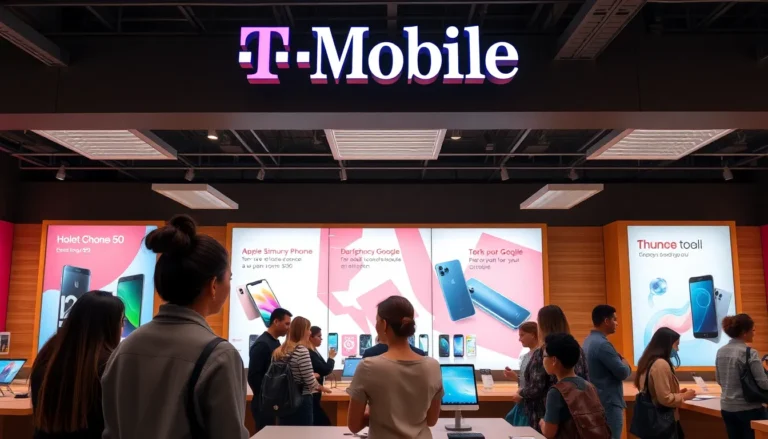Mobile technology is on the brink of a revolution, and it’s about to make your smartphone look like a flip phone from the ’90s. Imagine a world where your device not only responds to your voice but can also predict your needs before you even know them. Sounds like science fiction? Well, buckle up because the future is here, and it’s got a sense of humor.
As innovations like 5G, AI, and augmented reality continue to evolve, the way we interact with technology is changing faster than you can say “there’s an app for that.” From smart glasses that give you directions while you’re walking to foldable phones that fit in your pocket like a ninja, the possibilities are endless. Get ready to explore how these advancements will reshape our lives, making them more connected, efficient, and—let’s be honest—way more fun.
Table of Contents
ToggleOverview of Mobile Technology Evolution
Mobile technology has evolved significantly over the past few decades. Starting with basic mobile phones, the landscape now includes highly advanced smartphones with multifunctional capabilities. Early devices only offered voice communication, while today’s devices support high-definition video calls, mobile banking, and complex gaming experiences.
The introduction of 3G networks marked a pivotal shift, enabling faster internet access. With 4G technology, data speeds increased dramatically, fostering the growth of streaming services and social media applications. Now, the rollout of 5G networks facilitates unprecedented bandwidth and low latency, transforming how users connect and interact online.
Artificial intelligence integration has enhanced mobile devices’ functionality. From virtual assistants like Siri and Google Assistant to AI-driven photography enhancements, these features personalize user experiences. Augmented reality applications merge digital content with the real world, allowing users to engage with their environment in novel ways.
Foldable phones represent a significant innovation in mobile design. These devices combine the portability of smartphones with the larger screens typical of tablets. This flexibility invites new usage scenarios, encouraging users to adopt diverse productivity and entertainment formats.
The evolution of mobile technology continues, leaving a trail of innovations that influence daily life. For instance, wearable devices, such as smartwatches and fitness trackers, showcase how mobile tech integrates into health and wellness. As these advancements unfold, they promise to shape future interactions with an emphasis on connectivity and convenience.
Current Trends in Mobile Technology

Advancements in mobile technology significantly impact user experiences. Key trends include the rollout of 5G networks and enhanced artificial intelligence integration.
5G and Beyond
5G networks facilitate unprecedented speeds, allowing seamless streaming of high-definition content. Latency drops to a mere millisecond, enhancing real-time interactions for applications like gaming and video conferencing. The capacity for connecting multiple devices simultaneously paves the way for smart cities and IoT innovations. Future developments will focus on expanding coverage and improving accessibility in rural areas. Technologies that go beyond 5G, like 6G, are already being researched to further amplify mobile capabilities.
AI Integration in Mobile Devices
Artificial intelligence enhances user interactions through personalization. Virtual assistants learn usage patterns, providing tailored suggestions and automating routine tasks. AI-driven features like camera improvements enable stunning photo captures by optimizing settings automatically. Developers continue to focus on integrating machine learning models to anticipate user needs effectively. In addition to enhancing security with biometric authentication, AI contributes significantly to improving overall device functionality.
Future Predictions for Mobile Technology
Advancements in mobile technology will continue influencing everyday life, enhancing engagement and interaction across devices.
Enhanced User Experience
Users expect greater personalization and efficiency. AI-driven features will refine app functionality, predicting user needs based on historical data. Voice-activated assistants will become more intuitive, understanding context and language nuances. Seamless integration across devices will allow users to transition effortlessly between smartphones, tablets, and wearables. Augmented reality applications will elevate user experiences, merging digital and physical environments for tasks like shopping and navigation. Improved battery life and faster processing speeds will support extended usage without interruptions.
New Hardware Innovations
Smartphones will evolve with unique designs and features. Foldable screens represent a significant change, providing larger displays without sacrificing portability. Advances in battery technology will lead to longer-lasting power sources, enabling users to stay connected longer. The development of 5G and future 6G capabilities will enhance connectivity, allowing for faster data transmission. Wearable technology will integrate more seamlessly into daily life, expanding functionalities beyond fitness tracking to health monitoring and personalization. Innovations in biometric security will further ensure user safety and data protection.
Challenges Facing Mobile Technology
Mobile technology faces multiple challenges that could hinder its progress. Security risks and environmental implications remain significant.
Security and Privacy Concerns
Security and privacy concerns dominate discussions surrounding mobile technology. Data breaches pose threats to personal and sensitive information stored on devices. Cybercriminals target vulnerabilities in mobile apps, often exploiting poor security practices. User trust erodes when companies mishandle data. Privacy regulations like GDPR and CCPA compel organizations to adopt stricter data protection measures, but compliance varies. Many users remain unaware of app permissions and data usage, which exacerbates these issues. Organizations must enhance encryption methods and prioritize user education to safeguard information.
Environmental Impact
The environmental impact of mobile technology poses serious questions about sustainability. Manufacturing smartphones generates substantial electronic waste. Many devices contain non-biodegradable materials, leading to hazardous disposal challenges. Energy consumption during production and usage contributes to carbon emissions, raising concerns about ecological footprints. Regulations encourage recycling initiatives and responsible disposal, yet compliance rates remain low. Creating a circular economy that promotes device longevity and recycling programs is crucial. Manufacturers must prioritize sustainability by implementing greener production methods and supporting more eco-friendly habits.
The future of mobile technology is poised to redefine how individuals connect and interact. With advancements in AI and augmented reality, devices will become even more intuitive and responsive to user needs. As innovations like foldable screens and enhanced battery life emerge, they’ll cater to a growing demand for versatility and sustainability.
However, the industry must navigate challenges such as security risks and environmental concerns. The push for greener practices and robust data protection will be crucial in maintaining user trust and ensuring a sustainable future. As mobile technology continues to evolve, it promises to enrich daily life while addressing these pressing issues head-on.


